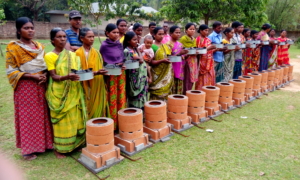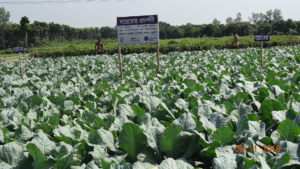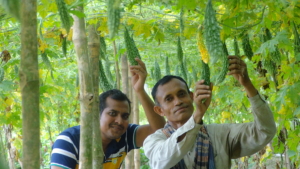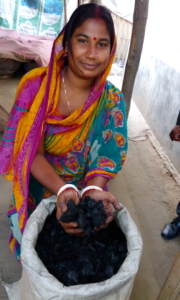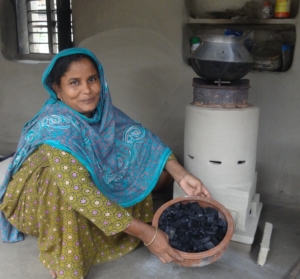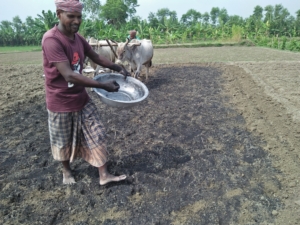Biochar Project.
Improving Food Security and Reducing C02 through Biochar
The degradation of soil fertility is a significant concern for crop production in Bangladesh. Excessive and unplanned use of chemical fertilizers, pesticides, and intensification of crop production with less use of organic fertilizers is the primary cause of decreased soil fertility, and soil ecosystem services, in the long run, have a drastic effect on climate change.
Biochar is getting considerable attention due to its potential agronomic benefit through soil amendment as well as an environmental benefit through carbon sequestration, which is also measured as a means of lessening climate change. Bangladesh abounds in huge amounts of agricultural biomass, which is considered significant feedstock for biochar production.
Biochar is a type of charcoal produced through the process of pyrolysis, which involves heating biomass like; wood, agricultural waste, or other organic matter in the absence of or limited presence of oxygen. This process results in the production of carbon-rich material known as Biochar.
Biochar is a stable form of carbon, and when added to soil, it can sequester carbon for hundreds or even thousands of years, reduce greenhouse gas emissions, and help mitigate climate change. It can enhance nutrient retention in soil, reduce the need for fertilizers, it also improves the soil’s cation exchange capacity, and hold essential nutrients for plants.
Biochar has high porosity and water-holding capacity that reduces irrigation needs and prevents soil erosion; it also provides a congenial environment for beneficial soil microorganisms, promoting their growth and activity.
CCDB is implementing the Biochar project titled” Improving Food Security and Reducing CO2 Through Biochar”since 2015, initially started in three project locations but now it has two project locations in Shibalaya, Manikgonj, and Manda, Naogaon with financial assistance from The Kerk in Actie, The Netherlands. The project has distributed Krishi Bondhu Chula-an improved cook stove, in English, means an agriculture-friendly cook stove. Initially, 500 stoves had been distributed in two project locations but the number is increasing with a view to scaling it up to other projects in new locations.
The stove has been designed in such a way that the Biochar is produced maintaining pyrolysis while cooking meals. It is also a fuel-efficient cook stove which is the intellectual property of the CCDB. The durability of the stoves is five years and got its efficiency test from The Bangladesh Council of Scientific and Industrial Research(BCSIR) and the Institute of Energy, Dhaka University.
Result demonstration is an effective tool to disseminate new technology to the reference people, a significant number of demonstration plots on different types of cereal crops, vegetables, and spices are planning to be established during this new phase of the project. Government officers from agriculture offices usually attend the event farmer’s field day and explain the positive effect of Biochar and Biochar Enriched Fertilizers to the local community farmers. Various printing media and electronic media have already published and telecasted various programs on the Biochar issue.
Training is an integral part of the project, Various types of training like; stove use, maintenance, & Biochar production, entrepreneurship development, etc. are being imparted to the stove users and young entrepreneurs. The project is being implemented in an enterprise mood when the maximum number of stove users will become biochar entrepreneurs, on top of that the project will give incentives to selling biochar and biochar-producing stoves. The project is strengthening the Enterprise group with a view to developing the Biochar value chain while establishing trade centers and exploring the marketing channel. The enterprise groups are selling Biochar to small dealers, nursery owners, farmers, homestead gardeners, and some researchers. Some private companies are showing their interest in using it in making customized commercial products.
In the process of obtaining a license for the commercialization of the Biochar Enriched Organic fertilizer, the project has achieved one-step approval from the Bangladesh Agricultural Research Council (BARC) and got clearance as a “No objection certificate” from the local government authority, which is a part of getting clearance from the Department of Environment. Besides, local dealers, farmers, some research bodies, and even some private companies are showing their interest in using it in their field of crop cultivation, research, and making customized commercial products.
CCDB has some Memorandum of Understanding (MoU) with various research organizations and universities in favor of scientific research, development, technical cooperation, and transfer of Biochar technology. The project is keeping its participation in various science and technology fairs locally to explore Biochar technology.
Contact Address:
Christian Commission for Development in Bangladesh (CCDB)
88, Senpara Parbatta, Mirpur 10, Dhaka 1216
Email: avijit.saha@ccdbbd.org

